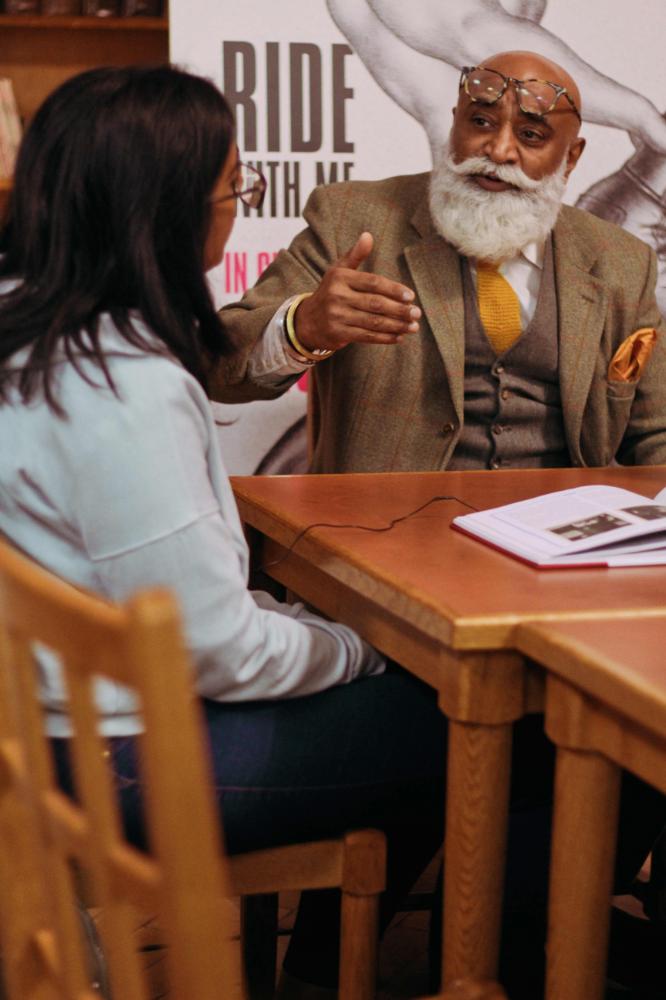Would you like to learn how to sensitively record memories and life-stories? Since 2012, we’ve trained hundreds of students, community groups, organisations and families. Together we will discover the power of oral history to open up new perspectives and preserve histories that would otherwise be lost forever.
Fun-packed, interactive training that was well run and useful. [Facilitation was] really excellent and gave practical examples.
Commission our introductory course to get the fundamentals sorted. Afterwards, our flexible additional modules will equip you with the specialist skills you need to meet your ambitions and ensure your subjects and participants contribute to creative, innovative and engaging project outputs. You can also hire us as consultants for your project – we’re happy to discuss your needs.
Our introductory course can be delivered in one-day if in-person, and over two half-day sessions if online. Our trainers have extensive experience of both in-person and online training.
One Day Introductory Course
This course will introduce you to oral history: what it is, and what you can do with it. In an active and participatory session, you and your group will discuss key theories behind the practice of oral history, and explore examples of oral history in different media, such as film, text or theatre.
You will learn practical interviewing skills, including questioning approaches, developing a topic guide, critiquing example transcripts and conducting your own practice interviews.
We will cover the essential business of ethics and working procedures, ensuring your project runs smoothly and everyone involved is kept safe.
Finally, you will have a practical introduction to using recording equipment, whether you are recording in-person or remotely.
If you would like the training to be tailored to your specific needs, for instance by focusing on involving young people or recording family members’ memories, please contact us to discuss.
Additional modules
I really enjoyed recording sound. It was a great feeling of heightened hearing. I’ll be listening more mindfully and creatively in future.
After completing the introductory course, you can customise your training with the following optional modules:
| Module | Description |
|---|---|
| Getting to grips with recording equipment | A practical session introducing different kinds of audio recorders and microphones |
| Field recording: the art of capturing ambience and sound effects (half day) | Practice using a variety of more specialist sound equipment for field recording. |
| Create an audio archive | Learn to store securely, catalogue and summarise your interviews |
| Introduction to audio editing | Learn to make clips from your oral histories using free/low cost software. Combine your recordings with atmospheric sound or music. |
| Sharing your oral history collection | Introduction to coding your archive and planning your creative outputs. (We can extend this into a longer series of workshops to support the production of your book, website, podcast, exhibition or more. These will help you involve participants and volunteers at every stage of the creative process.) |
Our rates
We charge £500 for a one-day training course for a group of up to 12 participants, over one or two sessions, plus travel expenses for the trainer to reach you.
Please note that the hire of any venue and provision of refreshments for participants is not included within the cost.
Our additional training modules are charged at £250 for a half day session. You could combine two additional modules together to form a day’s training.
For individual or family training sessions, please contact us to discuss costs and how we could work together.
Working with us
If you have specific needs, talk to us – we are very friendly! Our approach is flexible and we are open to adapting our training for particular audiences, to fit within project specifications and to adhere to your funding guidelines.
If you like the sound of what we do, please get in touch so that we can discuss your training needs and send you a full training plan.



